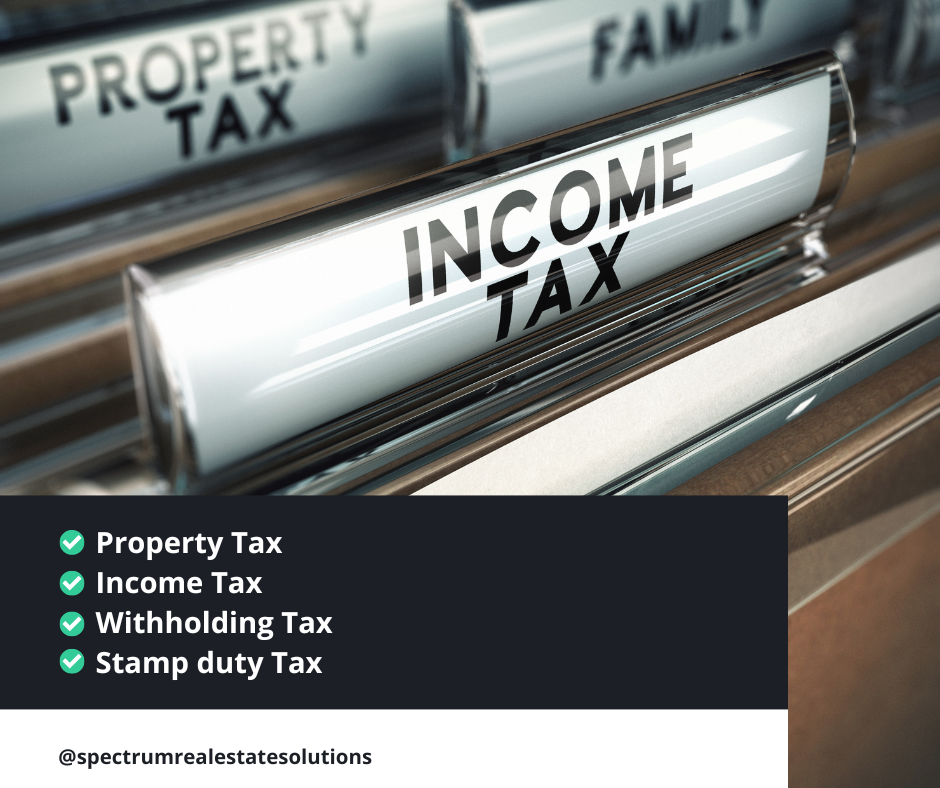TYPES OF PROPERTY TAXES IN UGANDA
- Property tax
- Rental income tax
- Capital Gains Tax
- Withholding tax
- Stamp duty
Property Tax (Rates)
Property rates in Uganda are levied by local government councils. Property tax is an old tax but almost died a natural death until the enactment of Local Government (Rating) Act in 2005, when it was revived and became active. The current rating is governed by the Local Government (Rating) Act of 2005, which came into effect on 1st November 2005 and replaced the Local Governments Rates Decree of 1979. This Act provides the mechanism for carrying out the valuation, assessment, billing and collection of rates; and applies to Kampala City Council, municipal councils, town councils and districts. This Act eliminates the monopoly of the Chief Government Valuer and allows local governments to appoint their own choice of qualified registered valuer. The Act is supplemented by the Local Governments (Rating) Regulations, 2005.
Rental income tax.
Rental income is the total amount derived from the lease of immovable property (land or buildings). Therefore anybody who earns rental income must therefore pay tax to Uganda Revenue Authority. It is filed separately.
Rental income tax policy that was revised and firstly amended in the financial year 2017/18 by Uganda Revenue Authority and has been successful. This tax is only associated with landlords and companies investing in rental investments. Every landlord is subjected to paying an annual rental income tax for his property and failure to pay may be forced or imprisoned for less than 6 months or fine of 2 million shillings.
NOTE: Rental Income tax is different from Property tax. Rental income tax is paid to URA whereas Property tax is paid to the local government.
Rental income tax is only paid when a person is letting out their immovable property (land or building) to another person and is earning income from it, but property tax is paid by a landlord for a commercial building (excludes residential), as long as it is occupied, it does not matter even if it is the landlord occupying it.
Why do you need to submit a Tax Return
Timely submission of tax returns enables you to avoid penalties and other legal consequences.
Submission of accurate information improves your risk rating levels with URA.
Submission of VAT returns that require a refund from URA provides the basis for a refund if one wishes to have a cash refund of taxes paid in excess
Capital Gain Tax in Uganda
Capital Gains Tax is the tax chargeable on the gains that accrue to an individual or a company on the transfer of property situated in Uganda. The rate of the tax is 30 per cent on the capital gains made on the sale of the property.
What exactly is the Capital Gains Tax?
The capital gains tax is the tax that is paid on the profits that you obtain once you sell any kind of asset like a property or land, or from an investment in the Ugandan territory. Whenever the sale value is greater than the price you paid for the investment/asset for its acquisition, capital gains tax will be paid on that difference, the profit.
What is Withholding Tax?
Withholding tax is a form of income tax deducted at source by one person upon effecting a payment to another.
The withholding agent (person effecting the payment) is supposed to make the payment of tax
Any person buying land, a house or any piece of property purchased primarily for business use is subject to the tax. Land for a Business Company and cooperation’s. This tax policy is spear headed by the buyer withholding tax, it should be withheld at the point of making the payment, whether cash or in any other form.
Individuals also incur WITHHOLDING TAX on payments of interest made to them. The WITHHOLDING TAX is at a rate of 15%. However, individuals are not obligated to withhold tax on payments made by them to taxable persons.
WITHHOLDING TAX is also incurred at a rate of 15% on dividends received by individuals. However, if the dividend is received from a listed company, the WITHHOLDING TAX incurred is 10%.
WITHHOLDING TAX is also charged on the importation of goods into the country. The tax charged is at a rate of 6% on the value of goods imported. Individuals are required to maintain records of the WITHHOLDING TAX paid on imported goods.
Tax at 6% is also deducted on receipt of payment from the government of Uganda, a government institution, a local government, or designated withholding agents for supplies exceeding UGX 1 million.
How is withholding tax calculated when paying?
6 percent on the gross payment is the amount of money to be paid as tax for your transaction and 15% to on a payment or transaction with a nonresident of Uganda This return must be filed by the fifteenth day of the month following the purchase. Should the purchaser fail to file the return by the due date, he or she is liable to pay a penalty for late filing.
A purchaser or buyer of property who fails to remit this tax by the fifteenth day of the month following the month in which the payment subject to withholding tax is made could face fines or prison.
What is Stamp Duty tax?
Stamp duty is a tax that is levied on single property purchases or documents. Stamp duty fees are paid to the Government to authenticate documents and make them legally binding in courts of law. This tax is paid at the point of transfer of title of the said land from the seller to the buyer, based on the value of the land as assessed by the Chief Government Value.
What is the stamp duty tax rate?
Stamp duty of 1.5% applies on all transfers, including transfer of shares and property. Stamp duty of 2% applies on exchange of property. The value of the property is determined by the government chief valuer.
Who pays for stamp duty?
The buyer of land or any property which needs stamp duty for accessing is required to pay the stamp duty. In case it is a lease, the sublease tenant to pay the tax.





